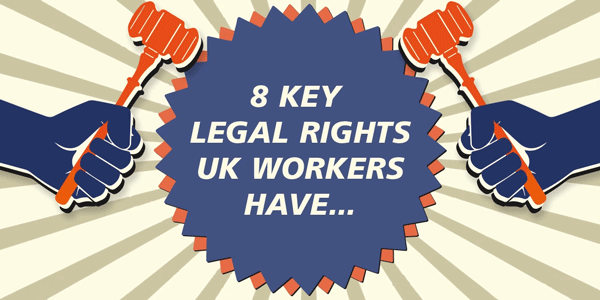Eight legal rights you need to know about in the workplace

This article was written by freelancer Lucy Skoulding
Employee rights are not always made clear to us when we start new jobs but knowing about them is important. Not only to protect yourself but also so you can support and stand up for others in the workplace.
Statutory rights ensure all workers are treated fairly by their employers under law. Here, we share some of the most important rights. They apply to most though not all workers. If you are a freelancer, or you are self-employed or working for an agency, you may not have the same rights.
The only universal rights for every worker are the right to minimum wage and to not be discriminated against.
1. The right to maximum working hours
Employees cannot be forced to work more than 48 hours in one week so must agree to put in additional hours in writing. Workers also have a legal right to paid holiday every year. Full-time employees can get up to 5.6 weeks (depending on the company) and part-time workers get pro rata holiday.
Workers can also legally take unpaid time off for reasons such as additional training, taking part in trade union activities, and for emergencies, like looking after dependants.
What people often don’t realise is if you have been working somewhere for six months you have the right to submit a request for flexible working. The business does not have to accept your request but must give a compelling reason why not if so.
2. The right to equal pay & minimum wage
UK workers must be paid at least National Minimum Wage, which at the moment is £6.70 as long as you’re 21 or over and £5.30 if you are 18 or over. All employees should receive a payslip breaking down their pay and deductions soon after starting, and employers cannot make any illegal wage deductions.
Under the Equal Pay Act 1970, unequal treatment between men and women over pay and employment conditions became completely prohibited. It was repealed but then many of its provisions were replicated in the Equality Act 2010. It is important to distinguish between unequal pay – which is illegal – and the issues surrounding the gender pay gap, where one sex is earning more than the other within a company because one dominates the higher up positions, which isn’t illegal but is an issue many businesses are tackling.
3. The right to health and safety at work
Health and safety laws state every worker has a legal right to daily and weekly time off. This means anyone working more than six hours must have a break of at least 20 minutes and everyone must get at least one day off in every seven days.
All workers also have a right to work in an environment where any risks to their health and safety are properly dealt with and controlled. This is the duty of the employer, who must also ensure they communicate with employees on all health and safety matters. The responsibility includes, for example, ensuring staff have a clean environment to work in, any necessary protective clothing, water for drinking, and first aid equipment.
4. The right to parental leave
Every woman who has a baby is entitled to up to a year of maternity leave, no matter how long they have worked for the company. Statutory leave for fathers is currently only two weeks and the fathers must have worked for the company for at least 26 consecutive weeks by the end of the 15th week of the pregnancy.
Leave is very different to pay, which can be more complex and varies depending on how long you have worked for a company. Fathers qualifying for paternity pay must earn at least £113 a week before tax and the rate is either £140.98 a week or 90% of your weekly earnings, whichever is lower. Mothers are only entitled to pay for 39 weeks of their leave, and this changes over time. They get 90% of their pre-tax weekly earnings for the first six weeks, £145.18 a week or 90% of their earnings if it’s less for the next 33 weeks and nothing after that.
Shared Parental Leave is a recent ruling which allows both parents to share up to 50 weeks of leave and 37 weeks of pay between you.
5. The right to trade union membership
Trade unions are organisations of workers who join together to achieve a common goal, like improving wages and working conditions and protecting their trade’s integrity.
Employees have the right to belong to a trade union, join or not join a trade union, and leave or remain a member of one at any time during their employment. Employers are not allowed to treat you unfairly or dismiss you because you do any of these things. Workers decide to join trade unions because they give you the power to negotiate a better deal through collective bargaining.
6. The right to not be discriminated against
Under no circumstances can anyone be discriminated against at work for gender, sexuality, age, background, race, religious beliefs, marriage and partnership, pregnancy, or disability. Examples of how this could happen include not choosing someone for a job or promotion, not paying them the same, and it could even occur indirectly through rules which put certain employees at a disadvantage.
Employers can actively prevent discrimination from occurring by ensuring they recruit inclusively, have an equal opportunities policy, and ensuring all staff follow these practices, by providing training on this topic, encouraging universal respect, and dealing with any complaints quickly. There is no situation when it is legally acceptable to harass or victimise anyone at work if they complain or expose a wrongdoing.
7. The right to fair dismissal
Employees must usually give employees at least the notice stated in their employment contract or the legal minimum notice period, whichever is longer. An employer can only dismiss a worker without notice if it considers someone to have done something which constitutes gross misconduct, for example committing fraud or being violent. Employers must always pursue the fair procedure when considering dismissal.
If you are threatened with or receive what you consider to be unfair dismissal, you can get help from a third party to solve the issue by mediation, conciliation, and arbitration. Trade union members can speak to their unions. You must have worked for the company for a minimum period before you have the right to claim unfair dismissal, and this completely varies depending on when you started working for the company and how long you have worked there, due to changes in the law.
8. The right to reasonable adjustments
Under the Equality Act 2010 employers must also ensure there are reasonable adjustments so that workers with disabilities are not disadvantaged, neither in the job application process or in the job itself. A person is classed as disabled under this law if they have a mental or physical impairment which has a substantially adverse and long-term impact on whether they can do day-to-day activities.
Reasonable adjustments remove or minimise disadvantages disabled people face and, while some businesses will spend a lot on expensive equipment, this doesn’t have to happen. Examples of reasonable adjustments include a keyboard for someone with arthritis, a wheelchair ramp, changing performance targets, and a phased return to work after a period off sick.
In summary
It’s important for anyone entering into an employment contract to know what their legal rights are while they are an employee, and this can be as small as what flexible work options may be available to as large as the rights every employee has to not be discriminated against.
It’s a good idea to understand employment laws not only for yourself but also for your colleagues and friends, because then you can credibly speak up if you feel someone is not being treated correctly. The key takeaway is to read every part of your employment contract before signing it and if there is any element of it you’re not sure about, always query it.
